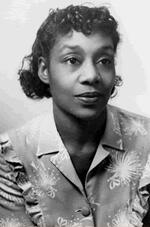-
African American Literature:
from the American nation's foundation to todayAMERICAN NATION'S FOUNDATION
Phillis Wheatley (December 5, 1753 - December 5, 1784)
SLAVERY
Frederick Douglass (by 1818 - February 20, 1895)
HARLEM RENAISSANCE
Zora Neale Hurston (January 7, 1891 - January 28, 1960)
Zora Neale Hurston was an American folklorist, anthropologist, novelist, short story writer. Of Hurston's four novels and more than 50 published short stories, plays, and essays, she is best known for her 1937 novel Their Eyes Were Watching God.
In addition to new editions of her work being published after a revival of interest in her in 1975, her manuscript Every Tongue Got to Confess (2001), a collection of folktales gathered in the 1920s, was published posthumously after being discovered in the Smithsonian archives.
Dorothy West (June 2, 1907 - August 16, 1998)
Dorothy West was a novelist and short story writer during the time of the Harlem Renaissance. She is best known for her novel The Living Is Easy as well as many other short stories and essays, about the life of an upper-class black family.
Richard Wright (September 4, 1908 - November 28, 1960)
Richard Nathaniel Wright was a novelist, poet, essayist, short story writer. Much of his literature concerns racial themes, especially those involving the plight of African Americans during the late 19th to mid-20th centuries. Literary critics believe his work helped change race relations in the USA in the mid-20th century.
James Baldwin (August 2, 1924 - December 1, 1987)
James Baldwin was an American writer, novelist, poet, playwright and activist. His essays, as collected in Notes of a Native Son (1955), explore palpable yet unspoken intricacies of racial, sexual, and class distinctions in Western societies, most notably in mid-20th century America, and their inevitable if unnameable tensions. Some Baldwin essays are book-length, for instance The Fire Next Time (1963), No Name in the Street (1972), and The Devil Finds Work (1976).
Amiri Baraka (October 7, 1934 - January 9, 2014)
Amiri Baraka (born Everett LeRoi Jones), formerly known as LeRoi Jones and Imamu Amear Baraka, was an African-American writer of poetry, drama, fiction, essays and music criticism. He was the author of numerous books of poetry and taught at a number of universities, including the State University of New York at Buffalo and the State University of New York at Stony Brook. He received the PEN Open Book Award, formerly known as the Beyond Margins Award, in 2008 for Tales of the Out and the Gone.
Baraka’s career spanned nearly fifty years, and his themes range from Black liberation to White racism. Some poems that are always associated with his name are “The Music: Reflection on Jazz and Blues,” “The Book of Monk,” and “New Music, New Poetry", works that draw on topics from the worlds of society, music, and literature. Baraka's poetry and writing have attracted both extreme praise and condemnation. Within the African-American community, some compare Baraka to James Baldwin and recognize him as one of the most respected and most widely published Black writers of his generation. Others have said his work is an expression of violence, misogyny, homophobia and racism. Regardless of viewpoint, Baraka’s plays, poetry, and essays have been defining texts for African-American culture.
Baraka's brief tenure as Poet Laureate of New Jersey (2002-2003) involved controversy over a public reading of his poem "Somebody Blew Up America?" and accusations of anti-Semitism,
and some negative attention from critics, and politicians.Ralph Ellison (March 1, 1914 - April 16, 1994)
Ralph Waldo Ellison was an American essayist, literary critic, novelist and short story. He was born in Oklahoma City, Oklahoma. Ellison is best known for his novel Invisible Man, which won the National Book Award in 1953. He also wrote Shadow and Act (1964), a collection of political, social and critical essays, and Going to the Territory (1986).
Audre Lorde (February 18, 1934 - November 17, 1992)
 Audre Lorde (born Audrey Geraldine Lorde) was a Caribbean-American writer, radical feminist, womanist, lesbian and civil rights activist. One of her most notable efforts was her activist work with Afro-German women in the 1980s. She spoke on issues surrounding civil rights, feminism, and oppression. Her work gained both wide acclaim and wide criticism, due to the elements of social liberalism and sexuality presented in her work and her emphasis on revolution and change. She died of breast cancer in 1992.
Audre Lorde (born Audrey Geraldine Lorde) was a Caribbean-American writer, radical feminist, womanist, lesbian and civil rights activist. One of her most notable efforts was her activist work with Afro-German women in the 1980s. She spoke on issues surrounding civil rights, feminism, and oppression. Her work gained both wide acclaim and wide criticism, due to the elements of social liberalism and sexuality presented in her work and her emphasis on revolution and change. She died of breast cancer in 1992.
-
Commentaires








